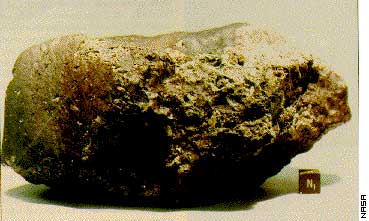Life's Building Blocks Found in Mars Rock

Nobody knows for sure how life formed in the first place, but the thinking is that first you had to have the building blocks—organic compounds containing carbon and hydrogen.
A new study finds these building blocks could have formed very early in the history of Mars.
The research says nothing about whether there is life on Mars, but it does indicate that the raw material for life should be easy to drum up on any cold, rocky world.
The research was two-pronged:
First, scientists re-examined the well-studied and highly controversial meteorite known as Allan Hills 84001. It's a rock from Mars that long ago was flung from that planet by an impact and fortuitously landed on Earth. It's been said by some scientists to contain direct signs of life on Mars, but that conclusion has been hotly debated for years.
Second, scientists looked at terrestrial rocks from Svalbard, Norway. The Svalbard rocks were created by volcanic eruptions in a freezing Arctic climate about a million years ago. The conditions are thought to be similar to ancient Mars.
Here's what they found:
Get the Space.com Newsletter
Breaking space news, the latest updates on rocket launches, skywatching events and more!
"Organic material occurs within tiny spheres of carbonate minerals in both the Martian and Earth rocks," said study leader Andrew Steele at the Carnegie Institution's Geophysical Laboratory. "We found that the organic material is closely associated with the iron oxide mineral magnetite, which is the key to understanding how these compounds formed."
Here's how it apparently happened:
As the rocks cooled, magnetite acted as a catalyst to form organic compounds from fluids rich in carbon dioxide and water. In the Mars meteorite, the organic material did not originate from Martian life forms but formed directly from these chemical reactions within the rock, Steele and his colleagues figure.
This is the first study to show that Mars is capable of forming organic compounds at all, the researchers said in a statement today. The research is published in Meteoritics & Planetary Science.
"The results of this study show that volcanic activity in a freezing climate can produce organic compounds," said study co-author Hans E.F. Amundsen from Earth and Planetary Exploration Services, a private company. "This implies that building blocks of life can form on cold rocky planets throughout the universe."
The finding sets the stage for NASA's Mars Science Laboratory (MSL) mission in 2009, said Steele, a team member for the Sample Analysis on Mars (SAM) instrument onboard MSL. "We now know that Mars can produce organic compounds. Part of the mission's goal is to identify organic compounds, their sources, and to detect molecules relevant to life. We know that they are there. We just have to find them."
- How Did Life Arise on Earth?
- 8 Worlds Where Life Might Exist
- The 10 Best Mars Images Ever
Join our Space Forums to keep talking space on the latest missions, night sky and more! And if you have a news tip, correction or comment, let us know at: community@space.com.

Rob has been producing internet content since the mid-1990s. He was a writer, editor and Director of Site Operations at Space.com starting in 1999. He served as Managing Editor of LiveScience since its launch in 2004. He then oversaw news operations for the Space.com's then-parent company TechMediaNetwork's growing suite of technology, science and business news sites. Prior to joining the company, Rob was an editor at The Star-Ledger in New Jersey. He has a journalism degree from Humboldt State University in California, is an author and also writes for Medium.









